Home | Category: Genesis and the Early Parts of Bible / Genesis and the Early Parts of Bible
NOAH AND HIS ARK
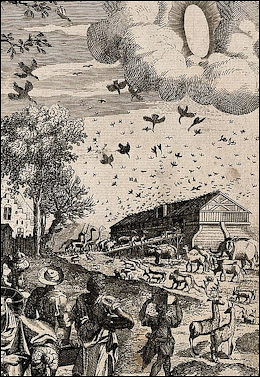
Noah, who in the Bible’s Book of Genesis built the ark that saved his family and many pairs of animals from a great flood, is revered by Judaism, Christianity and Islam. An entire chapter in the Koran is devoted to him.
According to Genesis, soon after the world and mankind were created, God produced a great flood to destroy mankind which had shown itself to be inherently wicked. Only the righteous, Noah and his family and a pair of each animal species were saved. Noah is also considered the first Biblical vintner. He planted a vineyard after the Great Flood and got drunk on wine he produced.
The Bible says: “God said unto Noah the end of all flesh has come before me...make thee an Ark of gopher wood.” Noah set sail after 40 days and 40 nights as rain flooded the world and came to rest on Mt. Ararat in northeast Turkey when the water’s recede.
Noah's Ark, according to the Bible and a 4000 year old Babylonian tablet, which tells the same story, was made of gopher wood (cypress) and pith. It was 300 cubits long, 50 cubits wide and 30 cubits high (a cubit equals 50 centimeters). This works out to about a football field in length and nine stories high. It had 63 compartments, and displaced 43,300 tons.
2704 B.C.: Noah born
ca. 2700-2400 B.C.: Old Kingdom period (Egypt)
ca. 2500-2200 B.C.: Ebla flourishes
ca. 2500 B.C.: First houses built in Jerusalem
ca. 2300-2200 B.C.: Priestess Enheduanna, first known author in the world
2203 B.C.: Shem born
2150 B.C.: The Flood
2100-1700 B.C.: Middle Kingdom period (Egypt)
[Source: Jewish Virtual Library, UC Davis, Fordham University]
See Separate Articles: FLOOD STORIES FROM ANCIENT MESOPOTAMIA africame.factsanddetails.com ; ANCIENT FLOOD STORIES AND EXPLANATIONS FOR NOAH'S GREAT FLOOD africame.factsanddetails.com
Websites and Resources: Bible and Biblical History: Bible Gateway and the New International Version (NIV) of The Bible biblegateway.com ; King James Version of the Bible gutenberg.org/ebooks ; Bible History Online bible-history.com ; Biblical Archaeology Society biblicalarchaeology.org ; Judaism Virtual Jewish Library jewishvirtuallibrary.org/index ; Judaism101 jewfaq.org ; torah.org torah.org ; Chabad,org chabad.org/library/bible ; Internet Jewish History Sourcebook sourcebooks.fordham.edu Christianity: BBC on Christianity bbc.co.uk/religion/religions/christianity ; Christian Classics Ethereal Library www.ccel.org ; Sacred Texts website sacred-texts.com ; Internet Ancient History Sourcebook: Christian Origins sourcebooks.fordham.edu ; Biblical Images: Bible in Pictures creationism.org/books ; Bible Blue Letter Images blueletterbible.org/images ; Biblical Images preceptaustin.org
RECOMMENDED BOOKS:
“The Lost Book of Noah: Christian Apocrypha” by Noah Amazon.com ;
“Ancient Near Eastern Texts Relating to the Old Testament” by James B. Pritchard Amazon.com ;
"Noah" (the film with Russell Crowe) Amazon.com ;
“The Book of Genesis Illustrated by R. Crumb” Amazon.com ;
“Genesis: Translation and Commentary” by Robert Alter (1997) Amazon.com ;
“As It Is Written: The Genesis Account Literal or Literary?” by Kenneth Gentry Jr ( Amazon.com ;
“Reading Genesis” by Marilynne Robinson Amazon.com ;
“Genesis: A New Translation of the Classic Biblical Stories” by Stephen Mitchell (1996) Amazon.com ;
“Genesis: A Living Conversation” by Bill Moyers 1996) Amazon.com ;
“In the Beginning, New Interpretation of Genesis” by Karen Armstrong(Knopf, 1999) Amazon.com ;
“The Torah: The Five Books of Moses, the New Translation” by the Jewish Publication Society Inc. (Editor) Amazon.com ;
“Commentary on the Torah” by Richard Elliott Friedman Amazon.com ;
“The Torah: A Modern Commentary” by Gunther Plaut Amazon.com ;
“The Holy Bible in English easy to read version” Amazon.com ;
“A History of the Bible: The Story of the World's Most Influential Book”
by John Barton, Ralph Lister, et al. Amazon.com ;
“Who Wrote the Bible?” by Richard Friedman, Julian Smith, et al.
Amazon.com ;
“The Complete Guide to the Bible” by Stephen M. Miller Amazon.com
Inconsistencies and Issues with the Noah Sory
There are a number of problems with the Noah Story. Critics have pointed out, for example, that Noah would have to have lead 460 organisms on his ark every second to get two of every species on board within 24 hours. There would have also been problems finding space of all these creatures and feeding them.
According to Live Science: The biblical tale has other questionable sections. For example, Noah was 600 years old when the flood started — we know humans don't live that long — and most species wouldn't survive being reduced to just two animals as they wouldn't have enough genetic diversity to create a viable population. What's more, it's unclear how every animal would be capable of making it to the ark in the first place — imagine penguins waddling from Antarctica to the Middle East.[Source: Patrick Pester, Live Science, May 14, 2023]
One of the inconsistencies in the Bible cleared up by the Dead Sea scrolls, according to one scholar, is the duration of Noah's flood. Some passage in the Old Testament say it transpired over a year, others say 40 day and 40 nights. The authors of the scrolls — members of a Jewish sect — edited the account by imposing a 364-day calendar on the biblical text and inserting the day of the week on which each event took place. In their version one year elapses from the day the earth began to the day the earth completely dried out. This enabled the sect to emphasize important feats and religious rituals within accordance with the bible. [National Geographic Geographica, April 1992].
Genesis 6: Wickedness in the World
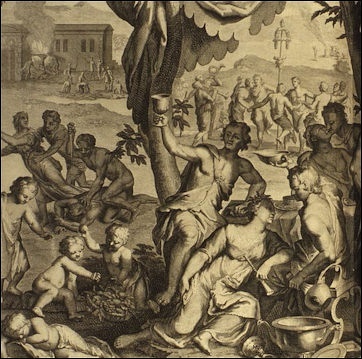
Genesis 6 When human beings began to increase in number on the earth and daughters were born to them, 2 the sons of God saw that the daughters of humans were beautiful, and they married any of them they chose. 3 Then the Lord said, “My Spirit will not contend with[a] humans forever, for they are mortal[b]; their days will be a hundred and twenty years.” -
4 The Nephilim were on the earth in those days—and also afterward—when the sons of God went to the daughters of humans and had children by them. They were the heroes of old, men of renown. [Source: [Source: New International Version (NIV), biblegateway.com -]
5 The Lord saw how great the wickedness of the human race had become on the earth, and that every inclination of the thoughts of the human heart was only evil all the time. 6 The Lord regretted that he had made human beings on the earth, and his heart was deeply troubled. 7 So the Lord said, “I will wipe from the face of the earth the human race I have created—and with them the animals, the birds and the creatures that move along the ground—for I regret that I have made them.” 8 But Noah found favor in the eyes of the Lord.
End of Genesis 6: Noah and The idea of an Ark Introduced
Genesis 6:9 This is the account of Noah and his family. Noah was a righteous man, blameless among the people of his time, and he walked faithfully with God. 10 Noah had three sons: Shem, Ham and Japheth. 11 Now the earth was corrupt in God’s sight and was full of violence. 12 God saw how corrupt the earth had become, for all the people on earth had corrupted their ways. 13 So God said to Noah, “I am going to put an end to all people, for the earth is filled with violence because of them. I am surely going to destroy both them and the earth. [Source: New International Version (NIV), biblegateway.com -]
14 So make yourself an ark of cypress[c] wood; make rooms in it and coat it with pitch inside and out. 15 This is how you are to build it: The ark is to be three hundred cubits long, fifty cubits wide and thirty cubits high. [d] 16 Make a roof for it, leaving below the roof an opening one cubit[e] high all around. [f] Put a door in the side of the ark and make lower, middle and upper decks. 17 I am going to bring floodwaters on the earth to destroy all life under the heavens, every creature that has the breath of life in it.
Everything on earth will perish. 18 But I will establish my covenant with you, and you will enter the ark—you and your sons and your wife and your sons’ wives with you. 19 You are to bring into the ark two of all living creatures, male and female, to keep them alive with you. 20 Two of every kind of bird, of every kind of animal and of every kind of creature that moves along the ground will come to you to be kept alive. 21 You are to take every kind of food that is to be eaten and store it away as food for you and for them.” 22 Noah did everything just as God commanded him.
Noah and His Family
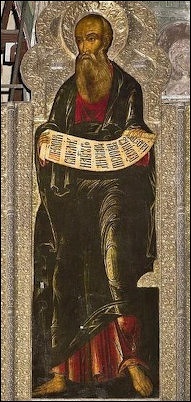
Noah icon
Genesis 5: 25 When Methuselah had lived 187 years, he became the father of Lamech. 26 After he became the father of Lamech, Methuselah lived 782 years and had other sons and daughters. 27 Altogether, Methuselah lived a total of 969 years, and then he died. - 28 When Lamech had lived 182 years, he had a son. 29 He named him Noah[c] and said, “He will comfort us in the labor and painful toil of our hands caused by the ground the Lord has cursed.” 30 After Noah was born, Lamech lived 595 years and had other sons and daughters. 31 Altogether, Lamech lived a total of 777 years, and then he died. 32 After Noah was 500 years old, he became the father of Shem, Ham and Japheth.
Genesis 7: The Lord then said to Noah, “Go into the ark, you and your whole family, because I have found you righteous in this generation. 2 Take with you seven pairs of every kind of clean animal, a male and its mate, and one pair of every kind of unclean animal, a male and its mate, 3 and also seven pairs of every kind of bird, male and female, to keep their various kinds alive throughout the earth. 4 Seven days from now I will send rain on the earth for forty days and forty nights, and I will wipe from the face of the earth every living creature I have made.” 5 And Noah did all that the Lord commanded him. [Source: New International Version (NIV), biblegateway.com -]
6 Noah was six hundred years old when the floodwaters came on the earth. 7 And Noah and his sons and his wife and his sons’ wives entered the ark to escape the waters of the flood. 8 Pairs of clean and unclean animals, of birds and of all creatures that move along the ground, 9 male and female, came to Noah and entered the ark, as God had commanded Noah. 10 And after the seven days the floodwaters came on the earth. -
End of Genesis 7: The Great Great Flood
11 In the six hundredth year of Noah’s life, on the seventeenth day of the second month—on that day all the springs of the great deep burst forth, and the floodgates of the heavens were opened. 12 And rain fell on the earth forty days and forty nights. 13 On that very day Noah and his sons, Shem, Ham and Japheth, together with his wife and the wives of his three sons, entered the ark. 14 They had with them every wild animal according to its kind, all livestock according to their kinds, every creature that moves along the ground according to its kind and every bird according to its kind, everything with wings. 15 Pairs of all creatures that have the breath of life in them came to Noah and entered the ark. 16 The animals going in were male and female of every living thing, as God had commanded Noah. Then the Lord shut him in. -
17 For forty days the flood kept coming on the earth, and as the waters increased they lifted the ark high above the earth. 18 The waters rose and increased greatly on the earth, and the ark floated on the surface of the water. 19 They rose greatly on the earth, and all the high mountains under the entire heavens were covered. 20 The waters rose and covered the mountains to a depth of more than fifteen cubits. [a][b] 21 Every living thing that moved on land perished—birds, livestock, wild animals, all the creatures that swarm over the earth, and all mankind. 22 Everything on dry land that had the breath of life in its nostrils died. 23 Every living thing on the face of the earth was wiped out; people and animals and the creatures that move along the ground and the birds were wiped from the earth. Only Noah was left, and those with him in the ark. 24 The waters flooded the earth for a hundred and fifty days. -
Genesis 8: 40 Days and 40 Nights:
Genesis 8 But God remembered Noah and all the wild animals and the livestock that were with him in the ark, and he sent a wind over the earth, and the waters receded. 2 Now the springs of the deep and the floodgates of the heavens had been closed, and the rain had stopped falling from the sky. 3 The water receded steadily from the earth. At the end of the hundred and fifty days the water had gone down, 4 and on the seventeenth day of the seventh month the ark came to rest on the mountains of Ararat. 5 The waters continued to recede until the tenth month, and on the first day of the tenth month the tops of the mountains became visible. [Source: New International Version (NIV), biblegateway.com -]
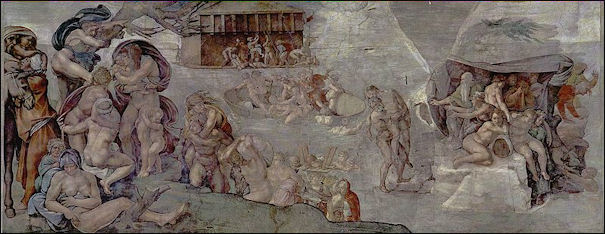
Noah deluge by Michelangelo
6 After forty days Noah opened a window he had made in the ark 7 and sent out a raven, and it kept flying back and forth until the water had dried up from the earth. 8 Then he sent out a dove to see if the water had receded from the surface of the ground. 9 But the dove could find nowhere to perch because there was water over all the surface of the earth; so it returned to Noah in the ark. He reached out his hand and took the dove and brought it back to himself in the ark. 10 He waited seven more days and again sent out the dove from the ark. 11 When the dove returned to him in the evening, there in its beak was a freshly plucked olive leaf! Then Noah knew that the water had receded from the earth. 12 He waited seven more days and sent the dove out again, but this time it did not return to him. -
End of Genesis 8: Departing the Ark
13 By the first day of the first month of Noah’s six hundred and first year, the water had dried up from the earth. Noah then removed the covering from the ark and saw that the surface of the ground was dry. 14 By the twenty-seventh day of the second month the earth was completely dry. 15 Then God said to Noah, 16 “Come out of the ark, you and your wife and your sons and their wives. 17 Bring out every kind of living creature that is with you—the birds, the animals, and all the creatures that move along the ground—so they can multiply on the earth and be fruitful and increase in number on it.” -
18 So Noah came out, together with his sons and his wife and his sons’ wives. 19 All the animals and all the creatures that move along the ground and all the birds—everything that moves on land—came out of the ark, one kind after another. 20 Then Noah built an altar to the Lord and, taking some of all the clean animals and clean birds, he sacrificed burnt offerings on it. 21 The Lord smelled the pleasing aroma and said in his heart: “Never again will I curse the ground because of humans, even though[a] every inclination of the human heart is evil from childhood. And never again will I destroy all living creatures, as I have done. -*
22 “As long as the earth endures,
seedtime and harvest,
cold and heat,
summer and winter,
day and night
will never cease.”
Genesis 9: God’s Covenant With Noah
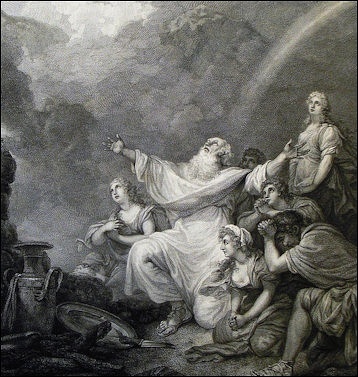
Genesis 9 Then God blessed Noah and his sons, saying to them, “Be fruitful and increase in number and fill the earth. 2 The fear and dread of you will fall on all the beasts of the earth, and on all the birds in the sky, on every creature that moves along the ground, and on all the fish in the sea; they are given into your hands. 3 Everything that lives and moves about will be food for you. Just as I gave you the green plants, I now give you everything. [Source: New International Version (NIV), biblegateway.com -]
4 “But you must not eat meat that has its lifeblood still in it. 5 And for your lifeblood I will surely demand an accounting. I will demand an accounting from every animal. And from each human being, too, I will demand an accounting for the life of another human being. -
6 “Whoever sheds human blood, by humans shall their blood be shed; for in the image of God has God made mankind. -
7 As for you, be fruitful and increase in number; multiply on the earth and increase upon it.” 8 Then God said to Noah and to his sons with him: 9 “I now establish my covenant with you and with your descendants after you 10 and with every living creature that was with you—the birds, the livestock and all the wild animals, all those that came out of the ark with you—every living creature on earth. 11 I establish my covenant with you: Never again will all life be destroyed by the waters of a flood; never again will there be a flood to destroy the earth.” -
12 And God said, “This is the sign of the covenant I am making between me and you and every living creature with you, a covenant for all generations to come: 13 I have set my rainbow in the clouds, and it will be the sign of the covenant between me and the earth. 14 Whenever I bring clouds over the earth and the rainbow appears in the clouds, 15 I will remember my covenant between me and you and all living creatures of every kind. Never again will the waters become a flood to destroy all life. 16 Whenever the rainbow appears in the clouds, I will see it and remember the everlasting covenant between God and all living creatures of every kind on the earth.” So God said to Noah, “This is the sign of the covenant I have established between me and all life on the earth.” -
Sons of Noah, Death of Noah
18 The sons of Noah who came out of the ark were Shem, Ham and Japheth. (Ham was the father of Canaan.) 19 These were the three sons of Noah, and from them came the people who were scattered over the whole earth. [Source: New International Version (NIV), biblegateway.com -]
20 Noah, a man of the soil, proceeded[a] to plant a vineyard. 21 When he drank some of its wine, he became drunk and lay uncovered inside his tent. 22 Ham, the father of Canaan, saw his father naked and told his two brothers outside. 23 But Shem and Japheth took a garment and laid it across their shoulders; then they walked in backward and covered their father’s naked body. Their faces were turned the other way so that they would not see their father naked. -
24 When Noah awoke from his wine and found out what his youngest son had done to him, 25 he said, “Cursed be Canaan! The lowest of slaves will he be to his brothers.” - 26 He also said, - “Praise be to the Lord, the God of Shem! May Canaan be the slave of Shem. 27 May God extend Japheth’s[b] territory; may Japheth live in the tents of Shem, and may Canaan be the slave of Japheth.” -
28 After the flood Noah lived 350 years. 29 Noah lived a total of 950 years, and then he died.
Noah in the Koran
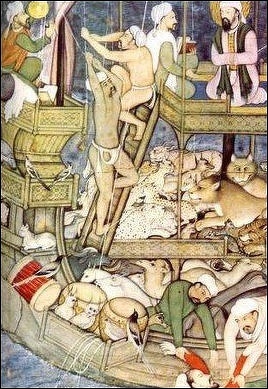
Muslim Noah
The Koran story of Noah goes: “Prophets are the messengers of Allah who came from time to time to guide mankind to the way of Allah, the path of righteousness. Amongst the many who came as guides and warners to the people, Prophet Noah (Alaihisalam) was one of them. He lived long before the time of our Holy Prophet Muhammad (Salallahu alaihi wasalam), the last of the prophets. God appointed Noah as the prophet for his people, so as to guide them to the right path and turn them away from their evil ways. The Holy Qur’an tells us the story of Prophet Noah and his people in a number of suras [3], namely sura 57 (Nuh), sura 11 (Hud), and sura 23 (al-Mu’minun), and many ayats [4] therein. It tells us of the strong faith which the Prophet had in Almighty God and about the final destruction of those who ignored the Divine Message. [Sources: Holy Qur’an with narritive filled in by Jehangir A. Merchant, simerg.com, October 4, 2011 |~|]
“Commanding Prophet Noah to warn his people, God said: “Warn your people before there comes upon them a grievous penalty.” — Holy Qur’an, 57:61 Obeying the command of God, Prophet Noah went to his people and said: “I have come to you with a clear warning that you worship none but God. Verily I fear for you the penalty of a grievous day.” — Holy Qur’an, 11:25-26. |~|
The chiefs fearing they would lose their power and authority over the people they ruled, did not approve of what Prophet Noah was preaching and sought to detract the people from the True Path. They argued with the Prophet saying: “We see nothing special in you except as a man like ourselves. Nor do we see any who have followed you but those who are the meanest amongst us and immature in judgment. Nor do we see in you any excellence over us; in fact we think you are a liar.” —Holy Qur’an, 11:27 |~|
Prophet Noah was not perturbed by their derogatory remarks and continued his divine mission purposefully. He called upon his people in a very polite and loving manner to mend their ways. He also warned them of the grievous consequences which would follow if they continued to worship the false gods and lead an immoral life. Assuring them that he was not seeking any wealth or power or favours from them, he said: “And O my people! I ask you for no wealth in return: my reward is from none but God.” — Holy Qur’an, 11:29 |~| But the chiefs continued to hinder Prophet Noah in his mission by instigating doubts about Noah. They would say to the people: “He is no more than a man like yourselves. His wish is to assert superiority over you. If God had wished (to send messengers), He could have sent down Angels. Never did we hear such a thing (as he says), among our ancestors of old.” — Holy Qur’an, 23:24. The chiefs would then turn in anger towards the Prophet and challenge him arrogantly: “O Noah! Indeed you have disputed with us and you have prolonged the dispute: now bring upon us what you have threatened us with, if you are of the Truthful Ones.” — Holy Qur’an, 11:32 |~|
“Prophet Noah would then remind them that it was not in his but God’s power to punish them for their evil ways. “Truly God will bring it on you if He wills, — and then, you will not be able to frustrate it.” — Holy Qur’an, 11:33 But all his warnings, his good advices and counsels seemed to fall on deaf ears. Except for a very few who had followed his guidance, others continued to worship the idols of stone with different names as attested in the following verse: “And they have said (to each other) ‘Abandon not your gods: abandon neither Wadd nor Suwa, neither Yaguth nor Yauq, nor Nasr.” — Holy Qur’an, 71:23 |~|
Prophet Noah re-doubled his efforts but all to no avail. He would then cry out to his Lord: “O my Lord! I have called to my people by night and by day, but my call only (increases their) flight (from the True Path). And every time I have called to them, that You may forgive them, they have thrust their fingers into their ears, covered themselves up with their garments, grown obstinate and given themselves up to arrogance. So, I have called to them aloud: further I have spoken to them in public and secretly in private.” — Holy Qur’an, 71:5-9 |~|
Noah’s Ark and the Flood in the Holy Qur’an
The Qur’an story of Noah goes: “As the people became more obstinate and refused to accept God’s message accusing Prophet Noah of falsehood, God decided to bring down His punishment upon the unbelievers. To Prophet Noah, God commanded: “Construct the Ark within Our sight and under Our guidance. Then when comes Our command, and the fountains of the earth gush forth, take on board pairs of every species, male and female, and your people except those of them against whom the Word has already been issued: and address Me not in respect of those who are unjust; for verily they shall be drowned (in the flood).” — Holy Qur’an, 23:27 [Sources: Holy Qur’an with narritive filled in by Jehangir A. Merchant, simerg.com, October 4, 2011 |~|]
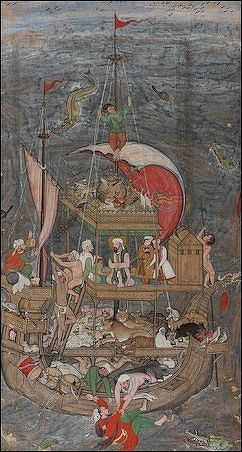
Noah in a 16th century Muslim Mogul miniature
As commanded, Prophet Noah now set upon the task of building the Ark with the help of the small group of believers. The sight of Prophet Noah and his men constructing the Ark seemed to amuse the chiefs and unbelievers. They did not realise the seriousness of the situation but only laughed and jeered. “Whenever the chiefs of his people passed by him, they mocked at him…” — Holy Qur’an, 11:38 |~| Prophet Noah would now answer back to their mocking comments in a very bold and straight-forward manner: “…If you ridicule us now, verily we too shall mock at you, even as you mock (at us). But soon will you know who it is on whom will descend a penalty which will cover them with shame and upon whom will fall a lasting penalty.” — Holy Qur’an, 11:38-39 |~|
“When the Ark was completed, Prophet Noah took with him his family and the believers, and a pair of every creature that was found on the land around him. Now God’s warning to the people that He would send floods upon them came to pass. “At length, behold! there came our Command, and the fountains of the earth gushed forth.” — Holy Qur’an, 11:40
The flood waters began to rise. Believers who had so far suffered at the hands of the chiefs and idol worshippers found themselves safe in Noah’s Ark. They offered their prayers and prostration to Almighty God as thanksgiving for the Mercy He had bestowed upon them. The unbelievers who had ignored God’s guidance were in a grievous state. All was lost to them. The heavy downpour of rain, the strong winds, the deafening thunder and the blinding lightning created confusion in their minds and fear in their hearts. They ran helter-skelter in search for safety. They climbed the roof-tops and the trees but nothing could save them now as the waters rose higher and higher. |~|
Amongst the unbelievers was Prophet Noah’s own son, and he too was desperately trying to save himself from the flood waters. Prophet Noah’s Ark with all aboard was sailing safely on the waters and just when the Prophet saw his son he called out to him and said: ‘O my son! embark with us and be not with the unbelievers’. The son replied: ‘I will betake myself to some mountain, it will save me from the flood’. And Noah said: ‘This day nothing can save you from what God has decreed, for only those on whom He has Mercy will be saved’. And the waves came between them and the son was among the drowned ones.” — Holy Qur’an, 11:42-43 |~|
Finally, when all the unbelievers were drowned in the flood, God commanded: “O Earth! swallow up your water, and O Sky! withhold your rain! and the water abated and the matter was ended. The Ark rested on Mount Judi.” — Holy Qur’an, 11:44. As the ark rested on Mount Judi, Prophet Noah prayed: “O my Lord! enable me to disembark with Your Blessings, for You are the Best of all to enable us to disembark.” — Holy Qur’an, 23:29 |~|
Image Sources: Wikimedia, Commons, Schnorr von Carolsfeld Bible in Bildern, 1860
Text Sources: Internet Jewish History Sourcebook sourcebooks.fordham.edu “World Religions” edited by Geoffrey Parrinder (Facts on File Publications, New York); “ Encyclopedia of the World’s Religions” edited by R.C. Zaehner (Barnes & Noble Books, 1959); “Old Testament Life and Literature” by Gerald A. Larue, New International Version (NIV) of The Bible, biblegateway.com; Wikipedia, National Geographic, BBC, New York Times, Washington Post, Los Angeles Times, Smithsonian magazine, Times of London, The New Yorker, Reuters, AP, AFP, Lonely Planet Guides, and various books and other publications.
Last updated March 2024
